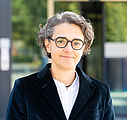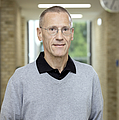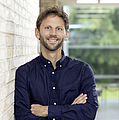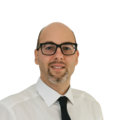Neuroscience Community
The following overview presents the scientific key questions and methods of the neuroscience community in Rostock. The information should lay the basis for joint projects and initiatives within the Centre for Transdisciplinary Neurosciences (CTNR).
Join us and get in contact with our neuroscience researchers for new projects and initiatives!
University Medicine Rostock
Anatomy

Lars-Ove Brandenburg
Professor, Group Leader
Group Neuroinflammation, Institute of Anatomy
University Medicine Rostock
Resesarch areas: Acute and chronic inflammation of the CNS

Linda Frintrop
Postdoctoral researcher, Group Leader
Anorexia Nervosa, Institute of Anatomy
University Medicine Rostock
Resesarch areas: Anorexia nervosa, starvation, brain metabolism, glial cells, starvation-induced hyperactivity mouse model, circadian dysregulation, neurodegeneration, brain atrophy

Markus Kipp
Professor, Director
Institute of Anatomy
University Medicine Rostock
Research areas: Mechanisms of immune cell recruitment into the central nervous System, Mechanisms of remyelination, Astrocyte and microglia diversity

Sarah Joost
Juniorprofessor, Deputy Director
Institute of Anatomy
University Medicine Rostock
Resesarch areas: Meningeal morphology and immunity, immune cell migration routes to the CNS

Andreas Wree
Senior Professor
Institute of Anatomy
University Medicine Rostock
Research areas: Effects of intrastriatal botulinum neurotoxin-A in hemiparkinsonian rats
Biostatistics and Informatics in Medicine and Ageing Research

Georg Fuellen
Professor, Director
Institute for Biostatistics and Informatics in Medicine and Ageing Research
University Medicine Rostock
Research areas: Omics/Bioinformatics for Neuroregeneration/Neurodegeneration research

Henrik Rudolf
Postdoctoral researcher
Institute for Biostatistics and Informatics
in Medicine and Ageing Research
University Medicine Rostock
Research areas: Statistical Methods in Clinical Trials, Multi-state Models, Stepped-wedge Designs
Diagnostic and Interventional Radiology

Marc-André Weber
Professor, Director
Institute of Diagnostic and Interventional Radiology
University Medicine Rostock
Research areas: Functional imaging including perfusion and diffusion MR imaging, MR spectroscopy, non-proton MR imaging, contrast-enhanced ultrasound, hybrid imaging, dose reduction in radiology, functional CT imaging
Experimental Gene Therapy and Cancer Research

Brigitte M. Pützer
Professor, Director
Institute of Experimental Gene Therapy and Cancer Research
University Medicine Rostock
Research areas: Translational biomedicine, molecular and epigenetic mechanisms of cancer progression, metastasis and chemotherapy resistance (E2F transcription factor signaling networks, p53/p73 signaling and functional genomics), tumor and stem cell reprogramming, development of gene and RNA-based therapeutics, Drug repositioning, genome editing technologies, Customized adenoviral and lentiviral gene transfer systems, tumor and stem cell targeting for personalised medicine
Experimental Surgery

Angela Kuhla
Professor
Rudolf-Zenker-Institute for Experimental Surgery, University Medicine Rostock, Germany
Research areas: metabolic syndrome, neurodegeneration, dementia, Alzheimer disease, caloric restriction, fgf21, hepatic-neuronal communication, lipid metabolism

Brigitte Vollmar
Professor, Director
Rudolf-Zenker-Institute for Experimental Surgery
University Medicine Rostock
Research areas: metabolic syndrome, neurodegeneration, dementia, Alzheimer disease, caloric restriction, fgf21, hepatic-neuronal communication, lipid metabolism
Forensic Psychiatry

Birgit Völlm
Professor, Director
Forensic Psychiatry
University Medicine Rostock
Research areas: Neurobiology of personality disorders and social cognition, Forensic psychiatry
History of Medicine

Ekkehardt Kumbier
Professor, Director
History of Medicine
University Medicine Rostock
Research areas: History of Psychiatry, Neurology and Medical Research including Ethical Implications, History of Neuroscience in the 20th Century, History of Science
Immunology

Stefanie Scheu
Professor, Director
Institute of Immunology
University Medicine Rostock
Research areas: Neuroinflammation, infectious immunology, dendritic cells, type I IFN, tetraspanins
Legal Medicine

Andreas Büttner
Institute of Legal Medicine
University Medicine Rostock
Research areas: (Forensic) Neuropathology, Forensic and genetic-neurobiologic aspects of illegal drug abuse, Forensic and genetic-neurobiologic aspects of suicide, Autopsy Service for DZNE and the National Reference Centre for human Prion diseases, Chair of the Ethical Commission
Medical Biochemistry and Molecular Biology

Simone Baltrusch
Professor of Biochemistry, Associate Director
Institute of Medical Biochemistry and Molecular Biology
University Medicine Rostock
Research areas: Diabetes, Metabolic Syndrome and Aging with special emphasis on Beta-cell stimulus – secretion coupling, mitochondrial function and dynamics, mitochondrially mediated organ aging, development and signally of advanced glycation end products, diabetic neuropathy; Methodological focus: High resolution microscopy

Markus Tiedge
Professor, Director
Institute of Medical Biochemistry and Molecular Biology
University Medicine Rostock
Research areas: Diabetes, Autoimmunity, Microbiome and Aging with special emphasis on beta cell destruction, mitochondrial function and dynamics, organ-specific signalling pathways of ROS Methodological focus: dynamics of mitochondrial oxygen consumtion; animal models of diabetes, microbiome analysis
Medical Genetics

Carsten Holzmann
Postdoc
Institute of Medical Genetics
University Medicine Rostock
Research areas: Neurodegenerative disases, Huntington's Disease (transgenic BACHD rat model), Niemann-Pick Type C1 (NPC1 mouse model), Parkinson's disease
Medical Psychology and Medical Sociology

Peter Kropp
Professor, Director
Institute of Medical Psychology and Medical Sociology
University Medicine Rostock
Research areas: Attention, headache, migraine, behaviour therapy
Neuroimmunology

Uwe Zettl
Professor, Section Head
Department of Neurology
Section Neuroimmunology
University Medicine Rostock
Research areas: Molecular pathomechanisms and biomarker research in multiple sclerosis
Neurology
Kevin Peikert

Clinician Scientist
Department of Neurology
University Medicine Rostock
Research areas: Hyperkinetic movement disorders, neuroacanthocytosis syndromes, VPS13-related disorders, VPS13/XK proteins, "bulk lipid transfer" in health and disease
► Meet Our Members: 10 Questions to Dr. Kevin Peikert (Clinician Scientist)

Alexander Storch
Professor, Director
Department of Neurology
University Medicine Rostock
Research areas: basic mechanisms of novel therapeutic approaches in Parkinson’s disease

Uwe Walter
Professor, Deputy Director
Department of Neurology
University Medicine Rostock
Research areas: All applications of neurosonology, especially brain sonography, Preclinical diagnostics of Parkinson’s disease, Brain death concept and diagnostics, Stroke associated infections
Neurosurgery

Daniel Dubinski
Senior Physician
Department for Neurosurgery
University Medicine Rostock
Research areas: Neurooncology, Pediatric Neurosurgery, Experimental Neurooncology, Traumatic Brain Injury

Thomas Freiman
Professor, Director
Department of Neurosurgery
University Medicine Rostock
Research areas: Oncology, Epilepsy, Neuroregenration

Florian Geßler
Deputy Director, Senior Physician
Department for Neurosurgery
University Medicine Rostock
Research areas: Experimental Oncology, NeuroOncology, Neuromuscular Research

Sae-Yeon Won
Assistant Professor
Department for Neurosurgery
University Medicine Rostock
Research areas: Vascular Neurosurgery, Traumatic Brain Injury, Epileptic Neurosurgery, Endoscopic and Robotic Neurosurgery
Nuclear Medicine

Bernd Joachim Krause
Professor, Director
Department of Nuclear Medicine
University Medicine Rostock
Research areas: Molecular Imaging, PET/CT, Radiopharmacy, small animal PET/CT Imaging
Otorhinolaryngology, Head and Neck Surgery

Robert Mlynski
Professor, Director
Dept. of Otorhinolaryngology, Head and Neck Surgery, ”Otto Koerner“
University Medicine Rostock
Research areas: active and passive middle ear implants, auditory pathway, plasticity and stem cell biology, lateral skull base disease including cholesteatoma, otosclerosis and acoustic neurinoma, quality of life with hearing disorders
Physiology

Denise Franz
Postdoctoral researcher
Oscar-Langendorff-Intitute of Physiology
University Medicine Rostock
Research areas: Dystonia, Deep Brain Stimulation, Patch Clamp, Electrophysiology, Motor Circuitry

Timo Kirschstein
Professor
Oscar-Langendorff-Intitute of Physiology
University Medicine Rostock
Research areas: Basic research and translational neurophysiology, Pathophysiology of epilepsy (animal models), Aging and cognition research
Rüdiger Köhling

Professor, Director
Oscar-Langendorff-Institute of Physiology, University Medical Centre Rostock, University of Rostock
Research areas: Animal Models of neurological Diseases, Epileptology and Dystonia Research, Experimental Neurophysiology, Cellular and network functional plasticity

Falko Lange
Postdoctoral researcher
Oscar-Langendorff-Institute of Physiology
University Medicine Rostock
Research areas: epilepsy, ischemic stroke, aging
Psychiatry, Neurology, Psychosomatics, and Psychotherapy in Childhood and Adolescence

Christoph Berger
Research associate, technical chair of the neurophysiological lab
Department of Psychiatry, Neurology, Psychosomatics, and Psychotherapy in Childhood and Adolescence
University Medicine Rostock
Research areas: Imaging methods in neuroscience: task- and resting state-fMRI EEG-fmri, VBM; qEEG, ERP; (r-)TMS, eyetracking, other psychophysiological methods: facial emg, eda, hrv; chronobiological analyses; Theoretical background of research: interaction between motor cortical excitability and cognition, emotional and social perception

Johannes Buchmann
Professor, Deputy Director, Chair of the Neurophysiological Research Laboratory
Department of Psychiatry, Neurology, Psychosomatics, and Psychotherapy in Childhood and Adolescence
University Medicine Rostock
Research areas: In childhood and adolescence: motor development, neurophysiological research laboratory (endogenously evoked potentials, inhibition / facilitation paradigms motor cortical evoked potentials), addiction, sleep, pain research, Fragile X Syndrome, intellectual disability

Michael Kölch
Professor, Director
Department of Psychiatry, Neurology, Psychosomatics, and Psychotherapy in Childhood and Adolescence
University Medicine Rostock
Research areas: Affective Disorders of children and adolescents, traumatic experiences and impact on (mental) health, psychopharmacology, high risk populations for mental disorders

Olaf Reis
Postdoctoral researcher
Department of Psychiatry, Neurology, Psychosomatics,
and Psychotherapy in Childhood and Adolescence
University Medicine Rostock
Research areas: developmental psychopathology: disorder and resilience on behavioural and systemic level (family, social support, social network), drug and sexual abuse and its prevention, intellectual disability
Psychosomatics and Psychotherapeutic Medicine

Carsten Spitzer
Professor, Director
Department of Psychosomatics and Psychotherapeutic Medicine
University Medicine Rostock
Research areas: Psychotherapy research, Structural and personality disorders, Social cognition

Stefan Teipel
Professor, Section Head
German Center for Neurodegenerative Diseases (DZNE),
Department of Psychosomatic and Psychotherapeutic Medicine
University Medicine Rostock
Research areas: Improving prediction, diagnosis, treatment and care of dementia
Radiotherapy

Elisabeth Schültke
Professor, Group Leader, Clinical Physician
Department of Radiotherapy
University Medicine Rostock
Research areas: Experimental Radiotherapy, Microbeam Radiotherapy, Neuroradiation Oncology, regeneration after neurotrauma and in neurodegenerative diseases
Translational Neurodegeneration Section "Albrecht Kossel"

Moritz Frech
Group Leader Cellular Neurophysiology
Translational Neurodegeneration Section "Albrecht Kossel"
University Medicine Rostock
Research areas: Patient specific induced pluripotent stem cells and their neural derivatives for disease modelling and drug discovery

Andreas Hermann
Professor, Section Head
Translational Neurodegeneration Section "Albrecht Kossel"
University Medicine Rostock
Research areas: Translational neurodegeneration, basic mechanisms of neurodegeneration and pathological aging
Schilling-professorship and research group funded by the Hermann und Lilly Schilling-Foundation

Jiankai Luo
Head of Molecular Neurobiology Unit
Translational Neurodegeneration Section "Albrecht Kossel"
University Medicine Rostock
Research areas: Neurodegeneration, Developmental Neurobiology, Stem cells

Jan Lukas
Postdoctoral researcher
Translational Neurodegeneration Section "Albrecht Kossel"
University Medicine Rostock
Research areas: medical and functional genetics, characterisation and rescue of misfolded protein mutants in monogenic diseases of the metabolism
University of Rostock
Animal Physiology

Emad Amini
Research Assistant
Department of Animal Physiology
Institute of Biological Sciences
University of Rostock
Research areas: Neurogenetics, peptidergic neurons, neuroethology

Fritz-Olaf Lehmann
Professor, Chair
Department of Animal Physiology
Institute of Biological Sciences
University of Rostock
Research areas: Neurobiology and Biomechanics of locomotion in Invertebrates, Drosophila Behavioral Genetics, Aerodynamics
Institute of Sport Science

Sven Bruhn
Professor, Chair
Institute of Sport Science
Exercise Science
University of Rostock
Research areas: adaptation to movement and training, neuromuscular activation, motor control, human gait

Timo Klein
Postdoc
Institute of Sport Science
Exercise Science
University of Rostock
Research areas: Cerebrovascular physiology, Combining exercise physiology and neuroscience for the prevention and treatment of chronic disease, Ageing, Extreme Environments (Hypoxia, Microgravity, Isolation and Confinement)
Intelligent Data Analytics

Martin Becker
Professor, Chair
Institute for Visual and Analytic Computing
Faculty of Computer Science and Electrical Engineering
University of Rostock
Research areas: Developing machine learning methods for understanding complex biomedical systems, background knowledge integration, multi-modal data fusion, Bayesian modeling and deep learning, pattern mining, sequential data analysis, big-data systems, and distributed algorithms; interdisciplinary and translational biomedical research
Marine Science Center

Frederike Hanke
Professor
Marine Science Center
University of Rostock
Research areas: Sensory systems, mainly vision, of (semi)aquatic animals from periphery to central processing
Lichtenberg Endowed Professorships funded by VolkswagenStiftung
► Meet Our Members: 10 Questions to Prof. Dr. Frederike Hanke (Marine Science Center)
Mobile Multimedia Information Systems

Thomas Kirste
Professor, Chair
Institute for Visual & Analytic Computing
Faculty of Computer Science and Electrical Engineering
University of Rostock
Research areas: Artificial Intelligence, Assistive Systems, Computational Behavior Analysis
Systems Biology and Bioinformatics

Olaf Wolkenhauer
Professor, Chair
Systems Biology and Bioinformatics
Institute of Computer Science
Department of Systems Biology and Bioinformatics
University of Rostock
Research areas: Systems biology, bioinformatics, systems medicine, data science, machine learning, image analysis
Research Centre
German Center for Child and Adolescent Health (DZKJ)

Anna Lene Seidler
Professor
German Center for Child and Adolescent Health (DZKJ)
Research areas: Child health, health equity, innovative evidence synthesis, epidemiology, biostatistics, meta-research
German Center for Neurodegenerative Diseases (DZNE)

Martin Dyrba
Group leader
German Center for Neurodegenerative Diseases (DZNE)
Research areas: Analysis methods for complex diagnostic data, neuroimaging analysis, machine learning, multimodal data modeling, deep learning, explainable artificial intelligence, artificial intelligence ethics, clinical decision support systems, dementia research
Ageing Research, Bioinformatics and Biostatistics
The Institute for Biostatistics and Informatics in Medicine and Ageing Research seeks to identify biomarkers for personalizing senotherapeutic, anti-fibrotic & anti-inflammatory drugs, as well as natural supplements & food. In the Neurosciences, we are specifically interested in biomarkers of health deterioration following ischemic stroke, as part of the SASKit study. Learning biomarkers by state-of-the-art bioinformatics emphasizes interpretability, based on omics data, in cooperation with our experimental & clinical partners, for the transcriptome, proteome, microbiome, and for molecular single-cell mechanisms. Unlike other bioinformatics groups, we are ourselves coordinating observational and interventional human trials, as well as a preclinical development effort. Precision prevention to maximize healthspan and compress morbidity is our goal as a member of all three profile areas of the Rostock University Medical Center, and of the Interdisciplinary Department on Ageing of Individuals and Society (AGIS) of Rostock University.
Contact: Prof. Dr. Georg Fuellen
Anorexia nervosa
Our group is interested to understand the physiology and pathology of anorexia nervosa and its impact on the brain, especially the influence of glia cells in the complex process of food intake. Of note, astrocytes and microglia play active roles in feeding circuits in the hypothalamus, the center for regulating food intake. Therefore, glia cell changes and dysfunctions might contribute to the clinical symptoms of AN and thus are important new research targets for understanding and treating semi-starvation and AN. To answer our scientific questions, we use methods as design-based stereology, a set of behavioral analyses such as object recognition and open field tests, western blot and immunohistochemistry. Current research projects for students (medical doctor or bachelor/master thesis) are available.
Contact: Dr. rer. nat. Linda Frintrop
Cell Lab and PET Tracer Production
We conduct experimental research on cell cultures with small animals and the development of new PET tracer production processes.
Contact: Prof. Dr. med. Bernd Joachim Krause
Cellular Neurophysiology
The Work Group Cellular Neurophysiology is concerned with the generation and characterization of model systems of neurodegenerative diseases based on hiPSC technology. The focus is on patient-specific neural model systems, which are generated by hiPSCs from skin fibroblasts of NPC1 patients.
Contact: Dr. Moritz Frech
Central Nervous System Boarders
The central nervous system (CNS) is separated from its environment by several barriers: the blood-brain barrier, the blood-meningeal barrier, and the blood-cerebrospinal fluid (CSF) barrier. Despite these barriers, peripheral immune cells can infiltrate the CNS under pathological conditions such as multiple sclerosis or meningitis. Our group focuses on understanding the morphology and function of these CNS barriers, with a particular emphasis on the leptomeningeal compartment and its role in immune cell migration and activation. We investigate the role of the most abundant cell type in the leptomeninges, the meningeal fibroblast, in meningeal inflammation using in vitro cultures of primary human leptomeningeal fibroblasts. To address meningeal heterogeneity, we analyze human tissue and murine models of neuroinflammation, studying morphology through histology, immunohistochemistry, and micro-CT scanning, and assessing gene expression using bulk RNA and single-nucleus NGS sequencing.
Contact: Jun.-Prof. Dr. Sarah Joost
Cognition in ALS
Our aim is better describe cognitive/behavioral phenotypes in ALS and their role on disease pathogenesis using a combination of deep patient phenotyping with post mortem neuropathology.
Contact: Prof. Dr. J. Prudlo
Embryonic Neurogenesis
The research group on embryonic neurogenesis focuses on neuronal plasticity during brain development. The aim of our work is to investigate the influence of oxygen on embryonic neural stem cells and the formation of different brain regions to elucidate the underlying mechanism of oxygen-dependent neurogenesis.
Contact: Prof. Dr. med. Alexander Storch
Experimental Deep Brain Stimulation
The research group Experimental Deep Brain Stimulation is primarily interested in understanding the effects and mechanisms of action of deep brain stimulation in a model of Parkinson's disease. Our goal is to better characterize this treatment method, which has been available in clinical application for decades, and thus to contribute to an optimization of deep brain stimulation in Parkinson's patients in the future.
Contact: Dr. med. Mareike Fauser
Forensic Psychiatry
We are a young and developing research group concerned with the quality and effectiveness of interventions for mentally disordered offenders. How can we improve the quality of life of our patients who are detained potentially for many years? How can we help them develop protective factors and reduce their risk of reoffending after discharge? Which interventions are successful for whom? What are quality indicators for forensic-psychiatry? A particular interest of our group is patient involvement in treatment delivery as well as research.
Headache/Pain
The headache/pain working group focuses on scientific studies on the epidemiology and clinical characteristics of headache and facial pain, the mode of action and effectiveness of neuromodulating procedures in headache disorders, the pathophysiology of migraines and burning mouth syndrome (BMS) as well as disorders of the somatosensitive system in various diseases.
Contact: Dr. Florian Rimmele
History of Psychiatry and Neurology
The working group focuses on the role of psychiatry and neurology as part of the state-controlled health system of the German Democratic Republic (GDR). We are interested in the structures relevant for psychiatry and neurology within the GDR health care system in the period from 1945 to 1990. In the project "Psychiatry in the GDR between help, custody and abuse?" we investigate in cooperation with the Clinic of Psychiatry, University Medical Centre Greifswald, within the research network "Seelenarbeit im Sozialismus - SiSaP" the structural anchoring and social status of psychiatric care in the Soviet Occupation Zone and GDR.
Contact: Prof. Dr. med. Ekkehardt Kumbier
Late-Translational Dementia Research at DZNE
We perform methodological research in order to improve the efficiency of translation of scientific developments along the translational continuum up to their implementation in clinical practice. This entails adaptation of methodology to specific research fields, in order to improve its adoption among researchers and produce data that can be used in subsequent steps and eventually support decision making. The work also includes producing tools enabling the participation of different kinds of professionals and stakeholders, who need to communicate effectively and to overcome the hurdles of hyper-specialization characterizing many scientific research sectors.
Contact: Dr. Marina Boccardi
Medical Genetics
The Medical Genetics working group focuses on the development of innovative, cellular disease models with the aim of improving molecular diagnostic and prognostic methods and testing personalized, molecular therapeutic treatment approaches for patients with rare metabolic diseases.
Contact: Dr. Jan Lukas
Metabolic Syndrome and Neurodegeneration
The research focus is to characterize new biomarkers for neuronal dysfunction on the basis of changes in the brain structure and brain metabolites.
Contact: Prof. Dr. rer. nat. Angela Kuhla
Molecular Neurobiology
The group Molecular Neurobiology led by PD Dr. Luo focuses on understanding the mechanisms of neuron loss and dysmyelination in neurodegenerative disorders, e.g., Niemann-Pick type C1 (NPC1) disease, and exploring the potential for future therapeutic targets. We take a multi-systemic approach including pathophysiological analyses and state-of-the-art molecular biological techniques both in an in vivo mouse model of NPC1 and in vitro cell culture systems to investigate how the defective cholesterol metabolism induces neurodegeneration in NPC1 disease.
Contact: PD Dr. Jiankai Luo
Movement Disorders and Deep Brain Stimulation
The working group deals with pathophysiological aspects of movement disorders, especially Parkinson's disease and dystonia, as well as the mode of action and therapy optimization of deep brain stimulation clinically in humans and in basic science.
In terms of methodology, in addition to clinical characterization, instruments from electrophyisology, imaging and nuclear medicine are used in a multimodal manner.
Multiple Sclerosis
Our group is interested to understand the physiology and pathology of the axon-oligodendrocyte-myelin unit. Particularly, we are interested to understand to what extend stressed oligodendrocytes regulate peripheral immune cell recruitment, and by which neuroanatomical pathways peripheral immune cells gain access into the CNS parenchyma. To address our scientific challenges we use state of the art techniques such as design-based stereology, a set of behavioral analyses such as high speed ventral plane videography, or positron emission tomography/computed tomography. Whenever possible, we compare our pre-clinical results with post-mortem samples, obtained from MS patient donors.
Neurogenetics
Our working group is particularly concerned with the genetic causes of movement disorders. One focus is on genetic causes of dystonia, on the one hand the rare monogenetically inherited forms such as DYT1 dystonia or paroxysmal dystonia (e.g. DYT9 or DYT18), on the other hand also the much more common sporadic focal dystonias (e.g. torticollis and blepharospasm), for the genetic ones susceptibility factors have been demonstrated.
Contact: PD Dr. Christoph Kamm
Neurological Intensive Care Medicine
The research spectrum on neurological intensive care medicine includes clinical studies as well as experimental investigations that deal with the mechanisms and therapeutic effects in critically ill patients in neurological intensive care medicine. The focus is on the treatment of status epilepticus, neurological complications of sepsis and the function of the gastrointestinal tract in the critically ill with neurological diseases.
Contact: PD Dr. med. Matthias Wittstock
Neurological Sleep Disorders
Our focus is particularly on the investigation of REM sleep behavior disorder as well as sleep disorders in neurodegenerative diseases such as idiopathic Parkinson’s syndrome, dementia and motor neuron diseases.
Contact: Dr. med. Wiebke Hermann
Neuropaediatric Research Group
The focus of our research is on drug therapy safety and social pediatric aspects in pediatric epileptology and developmen tal neurology. A second focus area is experimental research on pathomechanisms of epilepsy and on neuroprotection of the immature brain especially in neonatal hypoxic-ischemic encephalopathy.
Contact: Prof. Dr. Astrid Bertsche
(Experimental) Neurophysiology
The working group is particularly concerned with neurophysiological issues relating to interhemispheric connections in various clinical pictures.
Contact: PD Dr. M. Wittstock
Neurophysiology
In the field of research, the Institute of Physiology, within the two working groups Neurophysiology and Vegetative Physiology, deals with the development mechanisms of common neurological diseases such as epilepsy and dystonia, with the elucidation of learning processes in the brain, with the functioning of voltage-dependent channels in nerve and muscle tissue the regulation of blood flow and blood pressure as well as the basics of peripheral oxygen measurement.
Contact: Prof. Dr.med. Rüdiger Köhling and Dr. Falko Lange
Neurophysiology at the Psychiatry
Working Groups:
- Pain
- Time perception / delay aversion
- EEG as a BioMarker for mental disorders
Neuroproteomics/Connectomics
Neuroproteomics
The differential expression of proteins of cortical and sucortical regions are investigated by 2D-gelelectrophoresis and MS-identification. The analysis is performed over major points of postnatal (pp) development: 0-10 days pp, 14-21 days pp, 40 days pp and > 40 days pp. The differential expression of proteins from time step to time step should provide information of those proteins which are important for the differentiation of neuronal progenitor cells and the patterns of proteins of their exratracellular niches.
Connectomics
The connectome of the rat nervous system consists of connections between regions of the central and peripheral nervous system. Regions are considered at different levels of resolution down to particular populations of neurons and individual types of neurons. The connectome is characterized at different scales with regard to graph theoretical measures (neuroVIISAS). The connections are availbale in a database and we are continously developing new methods of visualization high dimensional data (visual analytics). The connectome is embeded in a neuroontology and fully linked with the all tract tracing reports of the rat nervous system. The connectome data can directly applied to computational neuroscience for population based simulation of the simulation engine NEST.
Contact: Prof. Dr. med. Oliver Schmitt
Neuroregeneration
Working groups:
- Niemann-Pick disease type C 1 - mouse model
- Neurodegeneration, basal ganglia interconnection and functional neurorehabilitation
- Parkinson's disease
Contact: Prof. Dr. med. Andreas Wree
Neurosonology
The scientific objective of this project is the development and validation of new applications of this imaging modality in the diagnosis and therapy of neurological diseases.
Contact: Prof. Dr. Uwe Walter
Translational Neurodegeneration
Our group aims on developing novel causative therapeutic approaches of neurodegenerative diseases using a bidirectional clinical translation approach with main focus on Amyotrophic Lateral Sclerosis and Frontotemporal Dementia and to effectively translate these in clinical practice by combining strategies for the reduction of pathological aging on the one hand together with specific therapies of neuro-degenerative mechanisms on the other hand.
Contact: Prof. Dr. Dr. Andreas Hermann
Wearables
Name | Institute / contact | Interested in / working with |
|---|---|---|
| Prof. Markus Kipp |
| |
| Prof. Thomas Kirste | Institute for Visual & Analytic Computing |
|
| Dr. Doreen Görß | Psychosomatic and Psychotherapeutic Medicine, University Medicine Rostock |
|
| Dr. Christoph Berger | Psychiatry, Neurology, Psychosomatics, and Psychotherapy in Childhood and Adolescence |
|

